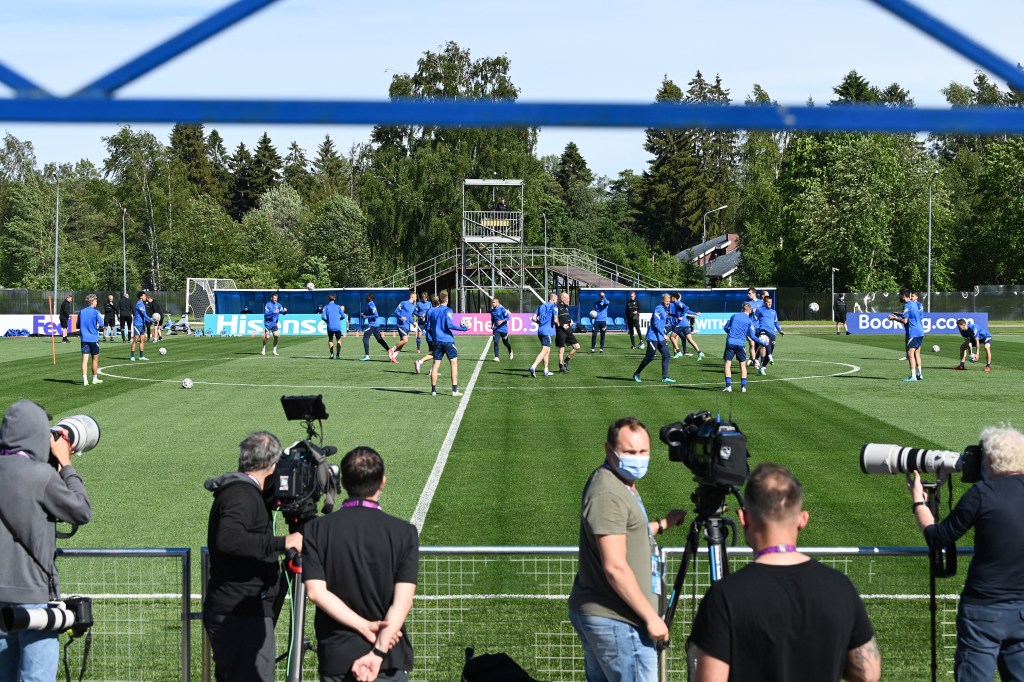New York, June 15, 2021 – The Union of European Football Associations should ensure that all journalists can report from its events freely and without political interference from host countries, the Committee to Protect Journalists said today.
Since late May, UEFA, an umbrella organization comprised of 55 national soccer associations across Europe, has denied or revoked the accreditations of at least six journalists seeking to cover the 2020 UEFA European Football Championship, citing their failures to pass background checks by Russian and Azerbaijani authorities, according to news reports and journalists who spoke with CPJ.
UEFA later reversed at least two of those decisions, according to those sources.
The Euro 2020 championship is being hosted by 11 countries, including Russia and Azerbaijan. Journalist accreditations must be approved unanimously by the organizing committees of the 11 host countries, according to news reports.
“The Union of European Football Associations should allow all journalists equal access to cover the ongoing championship, and ensure that none of the countries hosting the event use political pressure to ban members of the press,” said Gulnoza Said, CPJ’s Europe and Central Asia program coordinator. “It is essential that all international journalists can cover this event on equal grounds, and it is UEFA’s job to grant fair access to the championship for all members of the press.”
CPJ emailed UEFA and the Azerbaijani and Russian organizing committees for comment, but did not receive any replies.
In late May, UEFA revoked the accreditation of Robert Kempe, a correspondent for the German public broadcaster ARD and its regional affiliate WDR, blocking him from covering a championship game in St. Petersburg, Russia, according to news reports and a statement by WDR. The denial was issued because Kempe failed a “background screening” conducted by Russian authorities, according to those sources.
Kempe had recently reported on Russian state-owned energy company Gazprom’s alleged connections to European soccer teams, according to those reports.
On June 13, following news coverage of his situation, UEFA restored Kempe’s accreditation and allowed him access to the St. Petersburg venue, according to reports and a statement by WDR. In an email, WDR spokesperson Kristina Bausch referred CPJ to that statement; ARD did not respond to CPJ’s request for comment.
On June 8, Nobel Arustamyan, a correspondent for Russian sports broadcaster Match TV, said that Azerbaijan’s organizing committee at UEFA had vetoed his accreditation to cover the games in Baku, the capital, because of his previous visit to the separatist region of Nagorno-Karabakh, according to news reports.
On June 10, after international media criticism of the decision and intervention from the Russian Foreign Ministry, UEFA reversed its decision and accredited Arustamyan, according to reports.
CPJ emailed Match TV for comment but did not immediately receive any response.
On June 10, UEFA denied an accreditation for Maksim Pakhomov, a correspondent for the Russian sports news website Chempionat, to cover the games throughout Europe, according to news reports and a post by the journalist on his personal Instagram account.
Pakhomov was denied access to the games because Russian authorities said he failed a background check, according to those sources. The journalist wrote in his post that he believed the denial was linked to his 2017 detention at a rally in support of Russian opposition leader Aleksei Navalny, which he attended in his personal capacity.
He wrote that, while he could not confirm that detention was the reason his accreditation was denied, he could not find “any other reasons.” Later that day, Pakhomov published a comment on his post saying that, after news coverage of his denial, he had received access to the “fan zone” of the games in St. Petersburg. Contacted via messaging app, Pakhomov declined to comment on his accreditation situation.
On June 11, Konstantin Genich, also a reporter at Match TV, received a phone call from an Azerbaijani official asking him whether he was accredited for the games, and also asked whether he had visited Nagorno-Karabakh, he wrote in a post on Telegram.
When Genich, who wrote that he had visited Nagorno-Karabakh in 2009 to cover a soccer tournament, said that he had visited the region, the caller told him that he “had broken the law,” according to the post. Five minutes later, he received an email from UEFA saying that his accreditation had been revoked because he did not pass a background check, according to that post and news reports.
Genich told CPJ via messaging app that he could not comment on the incident.
On June 13, UEFA revoked the accreditations of two Armenian journalists, David Yeghiazaryan, a correspondent for the news website NEWS.am, and Karen Rafaelyan, correspondent for the news website vnews.am, according to news reports and both journalists, who spoke with CPJ in phone interviews.
Yeghiazaryan and Rafaelyan told CPJ that the association granted their accreditations on May 20 and 21, respectively. However, on June 13, the association sent each journalist an email saying that their accreditations “were not confirmed” due to a decision by the police of one of the host countries, but did not identify that country by name, they said.
The journalists said that they sent emails to UEFA asking for the name of the country that blocked their accreditations and reasons for doing so, but had not received any responses.
Separately, on June 11, Azerbaijani immigration authorities at Baku airport denied entry to Match TV reporter Mikhail Mossakovsky, citing a stamp from Armenia in his passport, according to news reports and a post by the journalist on Telegram.
Mossakovsky told CPJ via messaging app that he possessed a valid accreditation from UEFA to cover the match, and had received no warning that he would not be able to enter the country.
CPJ emailed the Azerbaijan Foreign Ministry for comment about this incident, but did not receive any response.
